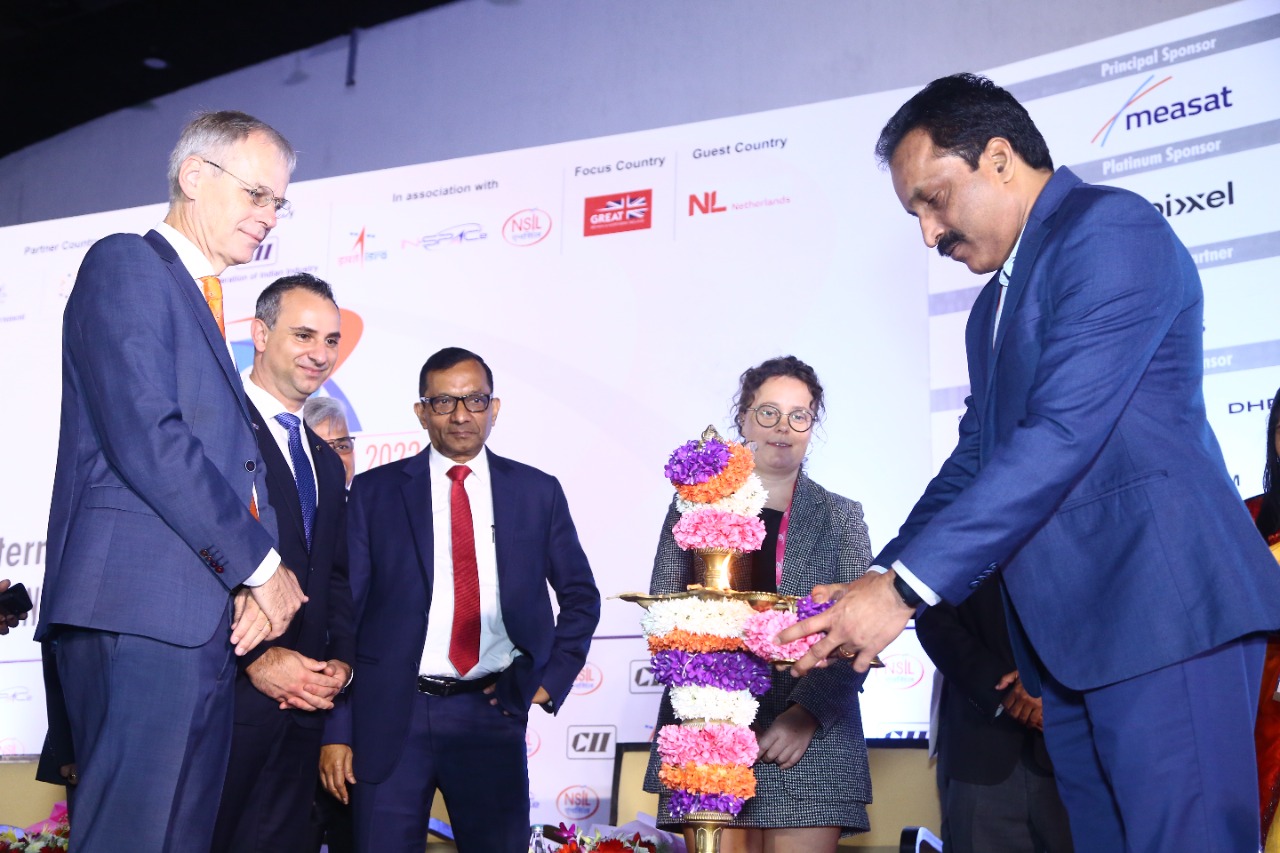ISRO Chairman, Department of Space Secretary and Space Commission Chairman S Somanat inaugurates 7th Bengaluru Space Expo 2022
The Australia – India space industry signed six memoranda of understanding at the inaugural day
Bengaluru, NFAPost: The three-day seventh Biennial Bengaluru Space Expo( BSX-20), attended by over 1000 delegates from 15 countries, representing private and public sector firms got off to a flying start on Monday as ISRO Chairman, Department of Space Secretary and Space Commission Chairman S Somanat made it clear that enabling the space sector to grow in a scale of economy.
“While we reform the space sector, we are perplexing for the country and our psychology is different. First and foremost we should believe Indian private can do what we need. Here ISRO should transfer technology. We have already made possible in the defence sector as we have made warships, guns etc,” said ISRO Chairman, Department of Space Secretary and Space Commission Chairman S Somanat.
ISRO Chairman, Department of Space Secretary and Space Commission Chairman S Somanat also highlighted 6 actionable areas to achieve the space sector to grow in a scale of economy with the collaboration of startups and establishments like NSIL, Inspace etc.
“Startups are the most amazing part of this space ecosystem. They promises a lot and they have a long way to go. Making successful is very difficult. These startups are attracting attention faster than I expected. It is interesting to note that how much enthusiasm they are showing,” said ISRO Chairman, Department of Space Secretary and Space Commission Chairman S Somanat.
It was also important to see, he said if it was possible to build new rockets involving all sectors; vehicles which could be operated globally. In this context, he added that the time was ripe to see more satellites being built by the Indian private sector for the global parties as well, with the Indian government being the anchor customer.
According to the ISRO chief, new opportunities are opening up for handling space debris, making space cleaner besides fuelling satellites in orbit. At the same time, it was worth remembering that the whole business of satellites was also related to servicing and building infrastructure on the ground; factors whose importance could not be undermined.
“Space sector is integral part of digital economy as it provides services like earth observation; communication etc. Amalgamation of this is viewed by the private and government. The connect between PSUs, industry, startup and academia is very important,” said ISRO Chairman, Department of Space Secretary and Space Commission Chairman S Somanat.
The conference has been organised by the Confederation of Indian Industry as “Nurturing New Space in India” as its main theme, along with an exhibition, in association with the Indian Space Research Organisation, Indian National Space Promotion and Authorisation Centre( IN-SPACE) and NewSpace India Limited. Over 100 companies are showcasing their expertise and products in the space sector.
The event assumes importance following the recent opening up of the space sector by the Indian government, evidenced by the host of Start-Ups which have taken the lead in exploiting the available opportunities.
He also referred to the six MOUS which were signed today between the Australian and Indian industries, lauding the effort to maximise such exchanges. The MOUs related to Australia’s Space Machines company which is collaborating with Bengaluru-based aerospace and defence manufacturing unit, Ananth Technologies.
Similarly, HEX20, an Australian Startup, will work with Hyderabad-based Skyroot Aerospace for providing launch services while Perth-based QL Space will partner with Skyroot to develop launch facilities in Australia.
Likewise, QL Space is partnering with Chennai-based GalaxEye to develop hybrid optic and radar payload, while also working with Satsure to build satellites and AI-based solutions to support agriculture, mining and defence industries.
Yet another MOU related to SABRN Health, Altdata and DCube, India. The companies will develop and integrate hardware, sensor technology and software to provide health support to astronauts.
Earlier, Mr Pawan Goekna, chairman, In-SPACe, drew a road map for the Indian space sector while emphasising the importance of institutional support and policy for it, boosting tech capabilities while emphasising that “out tech was good for today and a lot more needed to be done with the private sector playing a major role.”
Similarly, he highlighted the need for laying stress on the economic structure and space infrastructure, building financial capability and boosting global partnership and skill development. All these posed major challenges.
Dr Radhakrishnan, cmd, NSIL, on his part, spoke of how the size of satellites was shrinking with nano and microsatellites easing mass production. In fact, he said small sats ensured ease of production. He also added that NSIL would be keen to partner with small manufacturers to boost satellite building capacity.
Marten Van Den, Berg, ambassador of the Netherlands, in this context, noted that science and technology could flourish following increasing cooperation “across borders and geographies.” The benefits of outer space treaties accrued only through international cooperation based on interdependence.
Accordingly, the ambassador said that being a small country, cooperation and collaboration remained its DNA.
Enrico Palermo, head Australian Space Agency, on his part, noted that the strong bilateral ties with India would be further enhanced through the new India International Space Investment initiative. “This will unlock valuable opportunities for the two countries to partner in the space sector,” said Enrico Palermo.
The UK’s deputy trade commissioner, Anna Shotbolt, on her part, underlined the importance of close cooperation between India and her country while emphasising that possibilities of signing a free trade agreement between the two by Diwali could not be ruled out. She said that the UK was also committed to working with India in the space sector.
Earlier, Jayant Patil, Chairman, CII National Committee on Space, said the government has been making tremendous efforts to boost Start –Ups in the space sector as it was an important integrator. While welcoming the enthusiasm and interest that the conference has generated, evidenced by the huge participation, he said the CII had been working closely with different space agencie to leverage their expertise for the benefit of the industry.
Kamal Bali, Deputy Chairman, CII Southern Region, on his part, referred to the importance of Bengaluru Space Expo 2022 and how it had become an integral part of promoting the involvement of the private sector in the space sector.





